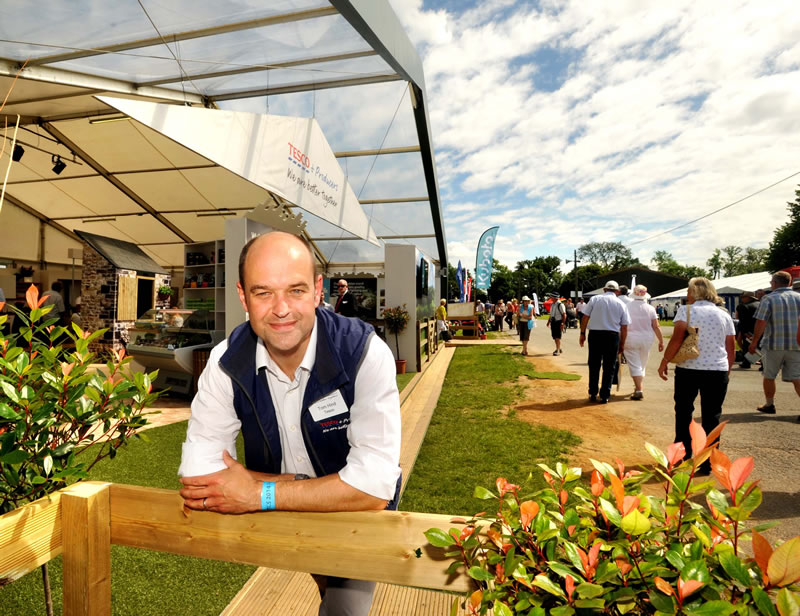
Noble Foods is launching a new tracker contract that will insure egg producers against volatile movements in feed costs.
The new contract is the result of an agreement between Noble Foods and Tesco – the country’s biggest supermarket chain. Tesco has described the tracker offer as a “significant step in strengthening our relationships with producers.” News of the initiative brought a positive response from Robert Gooch, director of policy with the British Free Range Egg Producers’ Association (BFREPA).
Robert, who has been pressing for some time for packers and retailers to look at introducing contracts that track the cost of feed, said, “I welcome the fact that Tesco and Noble are going down this road with some producers,” although he added, “Of course every producer who is considering the contract will need to look at the detail and the figures to make sure it offers the kind of guarantee they are looking for.”
Noble accepts that the tracker contract will not be suitable for everyone but it believes that many producers will be interested in protecting against “unforeseen future inflation.” Producers who sign up for the new contract will receive 2.5 pence per dozen less for their eggs than other producers, but their egg prices will automatically increase by 0.1 pence for every 50 pence per tonne increase in the price of feed.

The tracker contract also insulates producers against any potential collapse in the market price of eggs. James Baxter, vice chairman of BFREPA and a Noble producer, said he was seriously considering signing up for the contract. “If there was a sudden oversupply in the free range egg market and prices fell because of it, then our prices wouldn’t go down if we were on the tracker contract.”
James, a Scottish producer with 64,000 hens, said the contract would involve tying into price for both feed and eggs for four years. He said that the two big variables affecting producers were the price paid for eggs and the price of feed. “Is there much room for downside feed? No. Is there much room for upside feed? Yes.” At the time of speaking to the Ranger he said he had not finally made his decision, but he said he was 90 per cent sure that he would go ahead with the tracker contract.
Robert Gooch said that although the producer price was lower under the tracker contract, the offer of stability may well be attractive to some producers – particularly producers with high borrowings who may want to keep the bank manager happy. “It is a matter of horses for courses,” said Robert. “As long as it is there as an option and not compulsory then it may offer some security and insurance for those who don’t want to risk the highs and lows of the feed market.”
He said that Tesco already operated a cost-linked contract for dairy farmers and, from what he had seen, farmers who were on that contract seemed to have done fairly well. “I welcome the fact that we will now see it in the egg industry and that producers will now have a broader range of contracts to choose from.”
Tom Willings, contract producers and farms director with Noble, said that the principle of reflecting feed cost movements in the price of eggs had long been debated. “Until now, the risk of volatile commodity markets has been at the door of the primary producer. As the industry saw between 2010 and 2012, this can have a devastating effect on a business where feed can represent up to 70 per cent of the cost of production. This is a risk that Tesco have recognised and have been working with the industry to help find a solution for.”
Tom said, “By offering Tesco assurance through supply chain integration combined with high on-farm standards, supported by transparent and collaborative ways of working, we have concluded a long term supply agreement that links the price of eggs to commodity markets. As such, we’re now able to offer free range producers a contract with a simple egg price mechanism that directly reflects their monthly feed price. This is possible due to Tesco committing to back such a contract.”
Producers wishing to sign up for the tracker contract will need to sign up for the company’s producer scheme under which producers source both feed and pullets from Noble and use the company’s spent hen service. The Ranger believes that some 82 per cent of contract producers supplying Noble with eggs are already in the producer scheme. One such producer is Steve Tweddle, who farms in North Yorkshire, although he says he is undecided about whether or not to opt for the tracker contract.
Steve, who has 64,000 birds in two multi-tier units, said he had been interested for some time in the possibility of a tracker contract. “It’s just a question of losing 2.5 pence at the moment, at a time when the market seems fairly buoyant. Of course in two months time that could change and I could be biting your hand off for a 2.5 pence drop, but I am still undecided about what to do at the moment.”
He said, “If I was someone putting up another shed and I wanted to have some sort of security then the 2.5 pence might be worthwhile. I have no issue with signing up long term with Noble, it is just the 2.5 pence. The flip side is that the feed price is down quite significantly and a few people could argue that the egg price might have come under pressure, anyway. But I am going to have to think about it before I decide what to do,” said Steve.
Tom Willings said, “Every producers’ business is different, and we recognise that the principle of managing risk in this way will not be attractive to everyone, but we firmly believe that it’s a tremendous step forward to be able to provide producers with this choice.
“The feed market has been incredibly unpredictable since 2008. Today, consensus may be that commodities have stabilised and feed wheat in this country is oversupplied this year. However, world climatic and political change can happen very quickly, affecting any part of the constituent parts of the diet,” he said. “With current ration prices toward the bottom of the range seen in recent times, an option to ensure margins are protected against unforeseen future inflation has the potential to be of interest to many,” said Tom.
“We’re changing the way we work with Tesco, using our combined expertise to tackle volatility for the benefit of all. As with the dairy industry, these models that insulate the producer from variability in the cost of production, and even from peripheral market forces, allow the whole supply chain to focus on issues within our control, namely increasing efficiency, improving standards and delivering better value for the consumer in the long run.”
Tom Hind, group agriculture director of Tesco, said, “Commodity market volatility is a challenge for our customers, for Tesco and our producers. Through developing a mechanism that reflects variable production costs in the prices we pay our egg suppliers, we’re better able to manage this risk together.
“This is an important and significant step in strengthening our relationships with producers in order to secure supply and deliver for our customers.” He said that, earlier this year, Tesco had launched the Tesco Sustainable Egg Group, which enabled the company to “take these relationships further with our suppliers and farmers” and understand how it could deal with big challenges like volatility. This would ultimately enable it to deliver for its customers.
